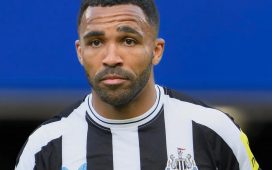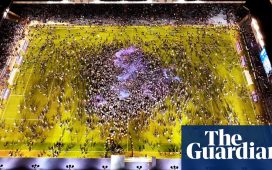Wilf McGuinness is 82 but his face lights up with vivid memories of the man who had such an impact on his life. “Matt Busby was a god,” McGuinness says simply as he looks up with an expression of gratitude and awe and remembers the football manager who turned Manchester United into one of the world’s greatest clubs. “We used to look up at him when we were growing up. We thought: ‘There he is. That’s the boss.’ That’s what we called him. Boss. He was a wonderful man.”
McGuinness was one of the original Busby Babes, a team of youthful brilliance which was decimated by the Munich disaster of 1958. He was injured and so missed being on the plane which took the lives of many of his best friends and teammates, while scarring those who survived. McGuinness was part of the second wave of Babes with whom Busby created a new team that would eventually become the first English club to win the European Cup in 1968. Another bad injury had ended his career long before then but Busby respected him so much that he persuaded McGuinness to become a coach at Old Trafford.
When he eventually retired for the first time in 1969, Busby chose McGuinness to succeed him. Over the next 18 months, McGuinness did a respectable job but he experienced the difficulties of replacing a legendary figure at a club as big as United. That struggle has been felt by all the managers who have tried to lead the club in the wake of Sir Alex Ferguson’s long and imposing reign at Old Trafford.
McGuinness is one of the key voices in a poignant new documentary about Busby. It explains the significance of Busby as being the first modern manager in English football who understood the power of the European Cup and who also recognised that the game would soon become big business. But the film is most affecting when charting the pain of Munich and the guilt felt by Busby. He had pushed hard for United to venture into Europe and yet the adventure was devastated by the loss of 23 lives when their plane crashed while trying to leave the tarmac for a third time on a snowy afternoon in Munich.
There is something beautiful yet painful in McGuinness’s words when he says: “Munich will always be in a corner of my mind.” He pauses and adds: “Always. Even now. They were very special people. I wasn’t in their class even though I played a lot in those days. I tried to forget the sad parts about it. But I don’t want to forget the players because they were great. I try not to remember it too much because it was definitely the saddest moment I’ve ever had. It was only because I was injured that I didn’t go on the trip. So I was very fortunate. Eddie Colman and Duncan Edwards were the wing halves but I played in that position too.”
It’s difficult for McGuinness to remember the day he heard the news of the tragedy but his son, Paul, who also used to work as a coach at Manchester United, helps his dad by sitting with us in the family home in Sale. “I think you were in town, weren’t you?” Paul prompts his father, “and you saw the story on the newsstands. I think you went to the Guardian office as the press people were getting the information.”
McGuinness nods. “Yes. I went to the Guardian and they told me what happened. I had lost teammates and friends.”
A long sigh slips from a great old man. “I thought it was the end of the world. I felt that’s it. United are finished now. We can’t carry on. We haven’t got a team. I also thought Matt was on the dying list at that stage. And I knew we had lost Duncan Edwards. What a great, great player he was. They all were. They were tremendous. But, really, Duncan was also like a god to us. He was the best I ever saw.”
In the film there is a shattering moment when, still recovering from his injuries, Busby returns to the training ground to address his squad. But he is so choked up that he can’t talk. Does McGuinness remember that moment? “I can remember him as a great man. I was in the squad then, after Munich. I was in it a bit before but nowhere near as good as some of them. We were just grateful Matt was back. He and Jimmy Murphy [Busby’s assistant and the driver of the club’s youth policy] were brilliant people. I’ve never met anybody with their personality or determination.”
Busby, clearly, was haunted by Munich. McGuinness nods. “It must have stuck in his mind. But he always said: ‘Go out and play well, and play for the fans.’ Not play for you. Play for the fans. We were very fortunate that, under Matt Busby, Man United became a great team. They weren’t a great team until he sorted it all out. He was a tremendous manager.”

The drab nature of life in the postwar years seeps through the archive footage but Busby was determined to bring joy to Manchester through football. “He wanted us to give people something to look forward to,” McGuinness says of Busby, who became United’s manager in 1945. Ten years later, in October 1955, McGuinness made his first team debut at the age of 17. Other gifted teenagers, like Edwards and Bobby Charlton, were also part of the Busby Babes. “£20 a week was the maximum wage. We couldn’t get more. But I was happy getting the bus to training at The Cliff in Salford or to games at Old Trafford.”
Did people get excited when they saw United players on the bus? “Yeah, a lot did. I was hoping the girls did, but they didn’t. It was mainly the lads. But it was good. I was usually with Bobby who was a very close friend. We were the same age and played for England boys together when we were 15. I was his captain at England schoolboys.”
Busby chose McGuinness for United’s first team before he selected Charlton. “That was mainly because my position became available.” McGuinness explains. “Bobby was a wonderful player. We grew up together and so we were good pals. He stayed at our house because I’m a Manchester lad and Bobby came down to United from Northumberland. We stuck together.”
Charlton survived Munich but, like Busby, he was scarred. Did he talk to his friend about the tragedy? “Oh no,” McGuinness says. “That was private.”
Yet, out of such grief and pain, Busby built a team that won the European Cup in 1968. United’s 4-1 defeat of Benfica was the culmination of a long quest for Busby. McGuinness then coached the reserves, having been forced to retire at 22 after breaking his leg, and he was close to Busby and Murphy. He coached George Best in some reserve games before the Belfast wizard broke into the first team and became a dizzying part of that European Cup-winning side.
Did Best stand out immediately as being exceptional? “You knew he was special. Only a blind man wouldn’t know. George was shy until he went to the dance halls. Then he wasn’t so shy. But they were all special. Think of Bobby and Nobby Stiles. And Bill Foulkes and Harry Gregg who survived Munich. Those two were very hard men. Tough as nails. I thought the world of them. We were a club where we thought about each other. That was down to Matt Busby and Jimmy Murphy.

“When we finally won the European Cup it meant a great deal. Especially for Matt. It was something we could hold up and say: ‘Look, after everything that happened, we’ve done it. Let’s do it again.”
Busby, however, was exhausted after managing United for 24 years and so, in January 1969, he announced he would step down at the end of that season. He was 60 and he hand-picked his successor – the 31-year-old McGuinness who took over as United manager in June 1969. “I was very proud of that. A bit surprised, but very proud. The press had got hold of the story first but I had a feeling it was going to be me. Matt and Jimmy always lifted me up.”
It must have felt like an impossible job, following Busby? “I didn’t look at it that way. It was a great job and a wonderful life.”
United finished eighth in his one full season in charge. McGuinness was sacked in December 1970 and Busby returned briefly but United finished eighth again that season. “You had five semi-final games, including replays, in the League Cup and FA Cup,” Paul says to his dad “You were a bit unfortunate. You didn’t get the signings you wanted. You took over an older team and you wanted to sign younger players like Malcolm Macdonald, Mick Mills and Colin Todd.”
His father smiles. “I was still a learner as a manager – don’t forget that.”
McGuinness must feel empathy for all the United managers who have followed Ferguson? He smiles and looks a little confused. “After all those years with Sir Alex, it was difficult for someone else to come in, wasn’t it, Dad?” Paul says. “I think you felt a bit sorry for David Moyes at the time.”
McGuinness is at his best in the more distant past but I ask him if he still goes to Old Trafford. “Dad watches them on TV,” Paul explains. “Sometimes we go to the ground.”

It must be tough watching United these days compared to the peak Busby and Fergie years? “They’ve got to find the sparks we had in our day,” McGuinness says. “For me there was only one Matt Busby. He was special.”
The documentary is intriguing in explaining how Busby led the way when he persuaded Louis Edwards, then the United chairman, to plan for the installation of corporate boxes. Busby could see into football’s lucrative future even though his roots in a Lanarkshire mining village meant he always valued his players over money. “He went to America, didn’t he?” Paul says of Busby, “and saw some of the great sports stadiums and the boxes. He made sure that Old Trafford got bigger and bigger. He was very forward-thinking.”
For McGuinness no one in football today can compare to giants like Busby and Edwards, Murphy and Charlton who lived through raw and beautiful days. Paul looks at his father. “I think you’ve done quite well today, haven’t you Dad?
“Yeah,” McGuinness says with a contented smile.
I suggest he must feel lucky, too, to have known Busby so well. “Oh yes,” McGuinness says, as his eyes gleam again with light. “He was such a warm man. Yeah. He was just terrific.”
Busby is available to own on digital on 15 November and DVD/Blu-ray from 18 November













